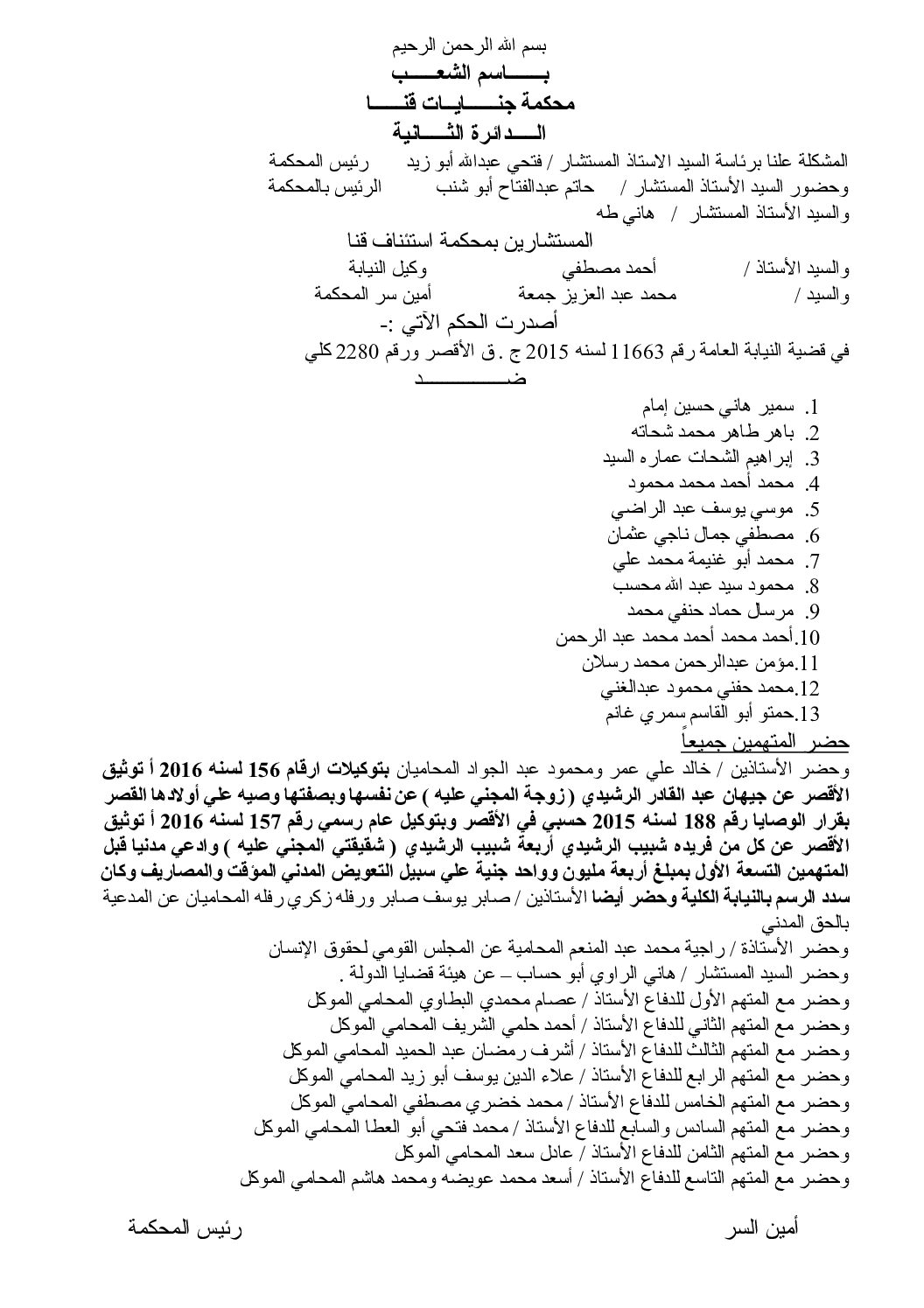ECESR Challenges Constitutionality of Protest Law

ECESR challenges constitutionality of protest law No.107 of 2013
The Egyptian Center for Economic and Social Rights, in cooperation with the legal offices of lawyers Khaled Ali and Tariq al-Awadi, filed an appeal last Saturday, to challenge the constitutionality of the ill-reputed Law on the Right to Public Meetings, Processions and Peaceful Demonstrations, decreed and adopted by former president Adly Mansour in November 2013.
The constitutional appeal was prompted by the Administrative Court’s decision to allow the challenging of Articles 8 and 10 of Law 107 of 2013, which had faced wide rejection and was considered by many as a means to confer a quasi-legality on the repression of any form of dissent in the country, whether political opposition or workers and community organizing to demand clean water or take a stand against rising prices.
ECESR took the decision to challenge the constitutionality of the Law in light of the steady escalation of violations against human rights and freedoms in Egypt, the targeting of political and rights activists, and law’s brutal impact in providing a pretext for the prosecution of citizens and fabricating accusations against them for political purposes, in addition to undermining the basic right to assembly and protest.
In mid-June of this year, the Administrative Courts allowed the challenge of Articles 8 and 10 of the Law, in a case filed against the President of the Republic, the Prime Minister, the Interior Minister, the Governor of Cairo, and commanding officer of Hadaeq al-Qubba police precinct. The officer had banned a demonstration against rising prices, whose notice was presented by lawyer Tariq al-Awadi according to the law.
However, the negative decision by the commanding officer came in blatant violation of the 2014 Constitution, stipulating the mere notification of authorities prior to demonstrations. The new protest law transformed this notice into a direct permit by the Interior Ministry, providing it with the authority to approve or deny the notification, in addition to many arbitrary measures.
The appeal put forward several challenges the constitutionality of the law, including the lack of any articles in the 2014 Constitution granting the power of legislation to the President of the Republic in the absence of the parliament, except in very specific cases, which did not apply to this situation. The appeal was also based on the law’s violation of various constitutional texts founded on the protection of citizens’ right to opinion, expression, and assembly.
The new protest law was in clear violation of the spirit of the constitution and lawmakers to commit blatant errors in the application of constitutional standards. It also deviated from its authority in organizing rights enacted in the constitution. For example, Article 8 violated the right to notification, restricting the announcement to 15 days before the protest date, something which did not exist in the old law. This time limit also exhausts the right to protest, as it is impossible to announce protests involving hundreds of thousands of people only 15 days in advance.
ECESR lawyer Mohammed Adel considered the current protest law to be more repressive than the provisions set and enforced by the British occupation in 1923 (Law 14/1923), and which stayed in effect under the monarchy and up until Hosni Mubarak’s era. The current law is more restrictive on the level of conditions for notification, giving the authority of receipt to the Interior Ministry, instead of an administrative entity with less bias against protests.
The constitutional challenge against the protest followed another similar appeal filed by ECESR against the new investment contracts law (32/2014), being considered by the Supreme Constitutional Court, which squanders citizens constitutional right to litigation by preventing third parties from state contracts with investors providing a dangerous cover for corruption. This came as part of ECESR’s attempts to review several unjust laws issued in the transitional period and following the presidential elections.
Constitution of the Arab Republic of Egypt, Article 73: “Citizens shall have the right to organize public meetings, marches, demonstrations and all forms of peaceful protests, without carrying arms of any kind, by serving a notification as regulated by Law…The right to peaceful and private assembly is guaranteed without need for prior notification. Security forces may not attend, monitor or eavesdrop on such meetings.”
Constitution of the Arab Republic of Egypt, Article 73: “In case an event which requires taking urgent measures, which cannot be delayed, occurs while the House of Representatives is not in session, the President of the Republic shall call the House for an urgent meeting to present the matter thereto. If the House of Representatives has not been elected, the President of the Republic may issue decrees having the force of law, provided that they are then presented to, discussed and approved by the new House of Representatives within fifteen days from the commencement of its session. If such decrees are neither presented nor discussed by the House, or if they are presented but not ratified thereby, their force of law shall retroactively be revoked without need for issuing a decision to that effect, unless the House confirms its effectiveness during the previous period or decides to settle the consequences thereof.

